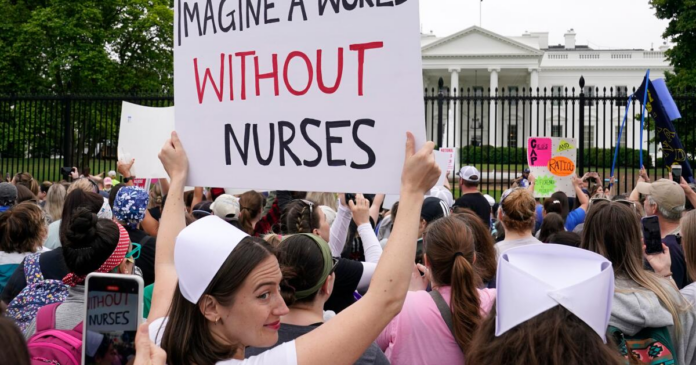Nevada ranks among the states with the biggest nursing shortages.
A rule change put forth by the U.S. Department of Education would cut federal student loans for nurses by more than two-thirds.
The change is not a foregone conclusion, and an online petition to stop the change has almost 200,000 signatures.
A Trump administration change in how the word “professional” is defined could worsen Nevada’s already significant nursing shortage.
“There’s the potential that this will impact between 25% to 35% of graduate nurses here at UNR who are financing their education in part with federal student loans,” said Charles Yingling, dean of the Orvis School of Nursing at the University of Nevada, Reno.
The U.S. Department of Education recently reverted to the definition of “professional” as used in a 60-year-old law.
The 1965 Higher Education Act lists 10 jobs that qualify as professional degrees. Along with medicine and law, these include pharmacy, veterinary medicine, chiropractic and theology — but not nursing.
The job of nurse practitioner hadn’t been created yet.
“So rather than embracing a more contemporary view of health care and professional practice, they embraced a very restrictive view as it was defined in 1965,” Yingling said of a Department of Education committee that is on the verge of adopting the older definition.
The issue is tied in with President Donald Trump’s so-called One Big Beautiful Bill, which puts caps on student loans not involving professional degrees.
If the Department of Education committee formalizes the redefinition of “professional,” then many nurses who get advanced degrees to become nurse practitioners or to teach nursing will be unable to get enough in student loans to cover their educations.
The loan cap for advanced nursing degrees would drop from $200,000 total to $65,000.
“The charitable part of me wants to believe this is an oversight by people who didn’t realize that nurse practitioners provide more than 1 billion health care encounters per year in this country,” Yingling said.
“It’s hard to believe that educated, well-intentioned policymakers would make such a glaring oversight.”
How change in definition of ‘professional’ could affect nursing in Nevada
A September 2025 article in Nurse Journal found that Nevada ranks 43rd for nurses per capita, with 8.44 per 1,000 population. That compares with a national rate of 9.65 nurses per capita.
“For us to just get to the average number of nurses per capita (nationally), we need about 4,000 additional registered nurses in the workforce,” Yingling said of Nevada.
Registered nurses are not the ones who would be affected by the change in the definition of “professional.”
They finish nursing school sooner than those getting advanced nursing degrees, and they become the nurse who might monitor your progress in a hospital room or assist your primary care provider.
The key distinction between a registered nurse and a nurse practitioner is that the nurse practitioner engages not just in nursing diagnosis but also in medical diagnosis, prescribing medications and ordering tests.
The types of nurses mostly affected by the Trump administration change would be nurse practitioners and those who teach nursing.
Nevada would be affected by fewer nurse practitioners because they are increasingly people’s primary care providers, especially in rural areas.
The state would also be affected if there were fewer people qualified to teach nursing. Without enough of them, the pipeline of registered nurses narrows.
“It’s the nurse educators who teach the next generation of nurses,” Yingling said.
What happens if nursing graduate students don’t have access to federal loans?
Yingling said he’s been thinking a lot about what will happen if nursing graduate students are excluded from receiving federal loans that cover their full education.
“There is one scenario where they say, ‘I’m not coming to graduate school, I’m not going to pursue my education,’” he said. “I hope that doesn’t happen.”
Another option is that people might take longer to finish their degrees by spreading out the cost over a longer time. This would delay how fast nursing students enter the workforce.
“When our state faces such a significant nursing shortage, we need all hands on deck sooner rather than later, and this creates a bottleneck in the training pipeline,” Yingling said.
A third scenario — the one he finds most troubling — is that commercial lenders might fill the void with higher interest rates and worse terms for borrowing than the federal government offers.
“Commercial lenders could step in to say we’ll lend you the money at terms that benefit commercial lenders and not our society,” he said.
‘This is not a foregone conclusion’
If the
Why a Trump plan to exclude nursing from ‘professional’ degree list sparks outrage
RELATED ARTICLES



